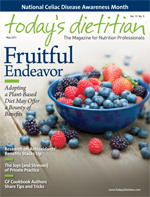
In the May issue of Today’s Dietitian, there is a great article about the latest diet catchphrase. No longer is there an emphasis on “low-fat” or “low-carbohydrate”. The newest term that you may have heard circulating around is a “plant-based diet”. Although this is basically what I try to emphasize to patients and what the food pyramid has been showing for decades, I’m glad that this term is being more widely used at larger healthcare organizations, like Mayo Clinic and the American Institute for Cancer Research, because anytime patients can hear something beneficial before they come to my office, the better. J
So what is a plant-based diet? No, it is not a vegetarian diet. But it “emphasizes vegetables, cooked dry beans and peas, fruits, whole grains, nuts, and seeds.” For most of us in the U.S. on a more Western diet, following a plant-based diet will be a gradual process. The article points out that it may have different meanings for different people depending on which plant foods are available. Animal foods like meat, yogurt, cheese, and milk are not discouraged, but simply the focus is to eat more plant foods, specifically whole, unprocessed foods that come directly from plants.
Here is an excerpt from the article:
“Results of an evidence-based review showed that plant-based diets reduced the risk of ischemia, hypertension, and type 2 diabetes; lowered LDL blood pressure; reduced body mass; and reduced overall cancer rate. Risk of chronic disease reduced due to decreased intake of saturated fat and cholesterol and increased intake of vegetables with more fiber and phytochemicals, nuts, and soy proteins. -Karmeen Kulkarni, MS, RD, BC-ADM, CDE, director of scientific affairs for Abbott Diabetes Care
Main stumbling blocks to following the diet are preparation time and a general mindset that meat needs to be the main focus of each meal. Both of which are absolutely hardwired into many people. “There is an idea that meat equals protein and that you have to have lots of protein to stay healthy,” the article stated. Boy, do I know it. And I definitely used to think that way too. Most people don’t realize that protein is found in all foods to varying degrees and by eating a variety of foods throughout the day, a person will more than likely consume adequate protein.
In January of 2008, my new year’s resolution was to eat less meat. I was in my last year of college and starting to apply some of the nutrition knowledge I had been learning for the past 3 years (finally, right?). It wasn’t that I cut meat out of my diet completely, but just that instead of worrying about all the “bad foods” that I was eating, I would focus more on making sure I ate more fruits, veggies, and whole grains. Good gracious, the difference was amazing – both in how I felt and in how the weight was easily coming off. And it’s still a work in progress. I still discover new plant foods that I incorporate into my diet on a daily basis.
Also, there is a new documentary called Forks Over Knives which follows a group of people as they transition from a meat-based diet to a plant-based diet and the effect it has on their health.

1 comments:
That's very interesting! I'm definitely guilty of basing every meal we have around meat(could be b/c I married mr. meat &potatoes:) but I'll be keeping this in mind, especially after the baby arrives.
Post a Comment